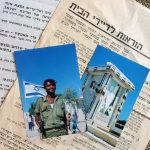Posters from the Six Day War, explaining how to remain safe and be good citizens; the soldier shown is at El Arish, Sinai, in late June or early July 1967. (photo by Shula Klinger )
This year marks the 50th anniversary of the Six Day War. While the conflict may have only lasted a few days, its impact was tremendous. Not only did it lead to the redrawing of Israel’s borders, it sent a powerful message to the rest of the world. Within 20 years of its establishment, Israel had become a strong, united country. Israelis – and Jews around the world – were jubilant.
In addition to the Israelis who walked away from their daily lives to fight in the war, many other recruits flew in from overseas. Keeping Israel safe – and Jewish – was their only purpose.
This year, a group of young Israelis is making a documentary to explore this phenomenon. With funding from Jewish Federation of Greater Vancouver, the production team is filming veterans of the Six Day War as they recall their time at the front. Lior Noyman, who is also a photographer, is the documentary’s editor. He observes that, without fail, “every one of them remembers exactly where they were when the announcement came about the war.”
Dan Gadassi, who worked in television production for 17 years in Israel, before moving to Canada, is fascinated by the impact of the 1967 war on these individuals and their communities.
To get a full picture of what it was like in Israel as the war ended, the local group has interviewed a wide range of veterans: Sephardi and Ashkenazi, secular and religious. “A Canadian woman, a volunteer; South Africans; a former Israeli soldier who liberated the Western Wall; two people who went to Israel to fight,” said Gadassi. Most of these individuals are retired now.
The documentary is not a recapping of the military actions that brought Israel to victory. It seeks to portray the atmosphere in Israel, as experienced by individuals, through “memories, beautiful stories about what happened when it ended.” Their narratives include the story of a young woman “hearing the sirens in Jerusalem … and what it was like approaching the wall after two thousand years,” said Gadassi.
In addition to the oral histories, the film will show archival materials from the Jewish Independent and artifacts from community members. Gadassi described “beautiful old videos, amazing photos of Israel 50 years ago.”
Some of the photos to be shown in the film have only recently come to light, as older relatives have passed on. They depict scenes from the battleground at El Arish in Sinai, shortly after the war ended. Sparsely captioned, these starkly beautiful images are of desert scenes, soldiers and the debris of war. They show the tremendous relief felt by a nation, said Gadassi, “whose survival was assured.”
No war story is uncomplicated, of course, and the situation in the region remains complicated. As Noyman observed, “They thought it would be the last war.”
The filmmakers look forward to taking viewers on a visual journey back to 1967, “on an emotional level,” said Gadassi. “We want to conjure up the atmosphere of the time.” Asked to sum up that atmosphere in a few words, he said, “We are here and we are staying.”
If you have a story to share or any archival materials, contact Noyman ([email protected]), Ayelet Cohen ([email protected]) or Gadassi ([email protected]). The screening and a display will be held on June 5, 7:30 p.m., at the Jewish Community Centre of Greater Vancouver. The entire community is invited to attend.
Shula Klinger is an author, illustrator and journalist living in North Vancouver. Find out more at niftyscissors.com.
Note: This article has been edited to reflect that the screening date changed.

